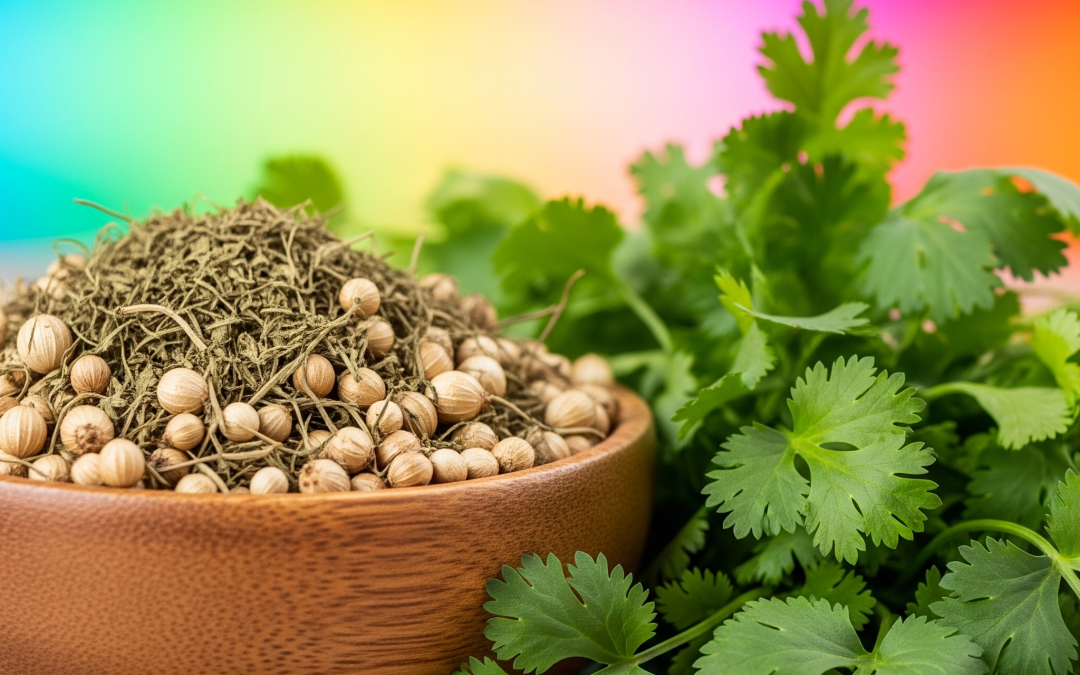Preface
Whether you call it dhaniya, coriander, or hara dhaniya, this humble herb has remained an indispensable part of Indian kitchens for centuries. From flavourful curries to tangy chutneys and masala blends, green dhaniya and dry dhaniya offer more than just taste—they are nature’s gift of flavour and health.
Table of Contents
-
Introduction
-
Origin of Dhaniya
-
Significance and Importance
-
Nutritional Value
-
Health Benefits
-
Culinary Uses
-
Common Allergens and Precautions
-
General and Medicinal Uses
-
Storage Tips
-
Madhu Savara’s Pro Tips
-
FAQs
-
Conclusion
-
Disclaimer
Introduction
Dhaniya, known globally as coriander, refers to both the green leaves (hara dhaniya) and the dried seeds (sukha dhaniya). Indian households cannot imagine their spice boxes or refrigerators without it. While the fresh leaves bring brightness to every dish, the seeds add depth to Indian curries, dals, and pickles.
Whether you’re sauteing vegetables or making biryani masala, dhaniya powder and fresh coriander are non-negotiable staples.
Origin of Dhaniya
Coriandrum sativum, commonly known as coriander, is believed to have originated in the Mediterranean and Middle Eastern regions. Ancient Ayurvedic texts and Egyptian scrolls mention dhaniya for its medicinal and culinary uses. India, over time, embraced it wholeheartedly—so much so that Rajasthan, Madhya Pradesh, and Gujarat are now key producers of dhaniya in the world.
Significance and Importance
In Indian households, dhaniya leaves are not just a garnish; they signify freshness and completion. Sprinkling hara dhaniya over sabzi or dal is almost a ritual. Meanwhile, dry dhaniya seeds and dhaniya powder are vital components of Indian spice blends—garam masala, chaat masala, sambhar masala, and more.
Culturally, offering dhaniya in religious offerings symbolises prosperity, and in Ayurveda, it’s a balancing herb for all doshas—Vata, Pitta, and Kapha.
Nutritional Value of Dhaniya (Per 100g)
| Nutrient | Green Dhaniya | Dry Dhaniya (Seeds) |
|---|---|---|
| Calories | 23 kcal | 298 kcal |
| Carbohydrates | 3.7 g | 55 g |
| Protein | 2.1 g | 12 g |
| Fat | 0.5 g | 18 g |
| Fibre | 2.8 g | 42 g |
| Vitamin C | 27 mg | 21 mg |
| Calcium | 67 mg | 709 mg |
| Iron | 1.8 mg | 16.3 mg |
Both green and dry dhaniya are rich in antioxidants, iron, vitamin C, calcium, and fibre.
Health Benefits of Dhaniya
-
Aids Digestion: Dhaniya water or tea made from coriander seeds eases bloating and gas.
-
Lowers Blood Sugar: Dry dhaniya helps regulate blood glucose levels, especially useful for diabetics.
-
Anti-inflammatory Properties: Helps reduce joint pain and internal inflammation.
-
Detoxifying Agent: Green dhaniya assists liver detox and kidney function.
-
Boosts Immunity: Rich in antioxidants like quercetin and vitamin C.
-
Improves Skin Health: Coriander juice helps in acne and pigmentation control.
-
Menstrual Relief: Traditional use of coriander seed decoctions eases cramps and flow irregularities.
Culinary Uses
Green Dhaniya:
-
Chutneys (hara dhaniya chutney, mint-coriander)
-
Garnish for curries, dals, salads
-
Marination for kebabs, paneer tikka
-
Filling for parathas
Dry Dhaniya:
-
Ground into dhaniya powder for spice blends
-
Roasted whole in pickles
-
Added to tempering (tadka) in dals and sabzis
-
Integral to masalas like chhole masala, pav bhaji masala
Common Allergen and Precautions
Although rare, some individuals may experience:
-
Skin rashes or itching after consuming coriander
-
Pollen-related allergies (especially in raw coriander)
-
Cross-reactions with celery or fennel
Precautions:
-
Avoid large quantities if you’re on blood-thinning medications.
-
Always wash fresh dhaniya thoroughly to remove pesticides.
Other General and Medicinal Uses
-
Dhaniya Pani (Coriander Water): Soaked seeds boiled in water act as a diuretic.
-
Face Mask: Dhaniya paste helps reduce acne.
-
Hair Rinse: A decoction of seeds boosts scalp health.
-
Home Remedy for Cold: Coriander tea with tulsi is a time-tested remedy.
Storage Tips
Green Dhaniya (Fresh):
-
Wrap in paper towel, store in zip pouch in fridge for 7–10 days.
-
Store in a glass jar with stems dipped in water, covered loosely.
Dry Dhaniya (Seeds/Powder):
-
Store in airtight jars in a cool, dry place.
-
Avoid moisture to prevent clumping or fungal growth.
-
Roast and grind small batches to retain aroma.
Madhu Savara’s Pro Tips
-
Grind roasted seeds with jeera to make a custom dhaniya-jeera powder—perfect for parathas and sabzis.
-
Add a pinch of dhaniya powder to lemon water for digestion.
-
Always roast whole coriander seeds lightly before grinding to release essential oils.
-
For chutney, add a spoon of curd or lemon juice to retain the green colour of hara dhaniya.
-
Freeze green dhaniya in ice cube trays with water or oil for off-season use.
Frequently Asked Questions (FAQs)
Q. Is green dhaniya good for diabetic patients?
Yes. Green dhaniya helps reduce blood sugar levels naturally when consumed regularly.
Q. Can I dry fresh coriander at home?
Yes. Sun-dry or oven-dry green coriander leaves and grind them into powder for off-season use.
Q. How do I prevent green coriander from turning black in the fridge?
Wrap loosely in paper towels and store in an airtight bag. Do not wash before storing.
Q. Is coriander seed water safe for daily consumption?
Yes, in moderation. One teaspoon of soaked seeds in warm water is safe and beneficial.
Conclusion
From its ancient Ayurvedic roots to every modern Indian kitchen, dhaniya—both green and dry—holds irreplaceable value. Its unmatched blend of taste, aroma, and health benefits makes it a must-have herb in your spice box and refrigerator. From seasoning to healing, from garnishing to detoxing, coriander remains the silent star behind India’s bold flavours.
Disclaimer
The information provided in this blog is for educational purposes only and does not constitute medical advice. Always consult a certified medical practitioner before using dhaniya or any spice for therapeutic purposes. Madhu Savara assumes no responsibility for misuse or allergic reactions caused by the consumption of coriander in any form.


